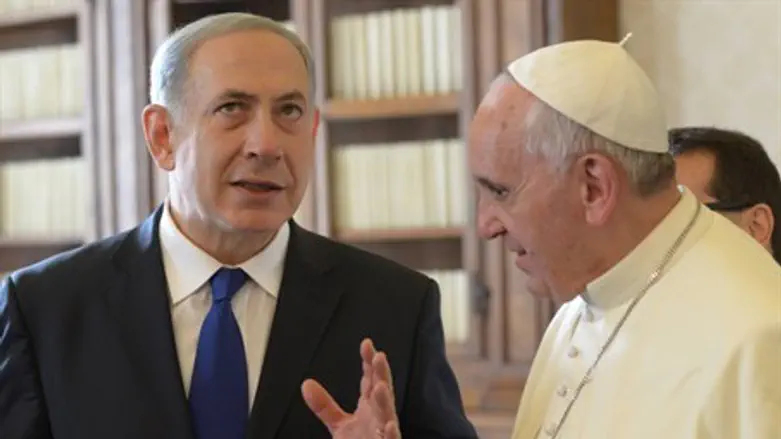
Pope Francis will address a joint session of Congress on Sept. 24, a week after Congress votes on a measure of disapproval regarding the nuclear deal with Iran, and probably before a vote to override a presidential veto, if one is required. While the visit was scheduled independently, without the Iran vote in mind, Francis's presence may make the lobbying efforts of the forces opposed to the deal more difficult.
It is not known if the Pope will say anything about the nuclear deal but according to Politico, “he’s not shy about his opinions, and odds are that he will discuss his support for the Iran deal. If so, his remarks could prove the antithesis of the speech Israeli Prime Minister Binyamin Netanyahu made to Congress in March, which was aimed at galvanizing opposition to the deal.”
The Vatican said in July that the agreement reached by Iran and the P5-1 powers on the Iranian nuclear program “is viewed in a positive light by the Holy See.”
“It constitutes an important outcome of the negotiations carried out so far, although continued efforts and commitment on the part of all involved will be necessary in order for it to bear fruit,” a Vatican spokesman said.
In December, Francis delivered a message to the Vienna Conference on the Humanitarian Impact of Nuclear Weapons, in which he said nuclear weapons should be "banned once and for all" to secure peace and wellbeing for all present and future generations.
The day after he addresses Congress, Francis will be speaking at the UN General Assembly. The timing of the General Assembly means that numerous global leaders, many of whom favor the deal, will also be schmoozing with lawmakers in New York and Washington, notes Politico, heightening political pressure.
'A blessing'
The website adds that the White House “sees the pope’s visit as a blessing.”
“It’s the pope. So I’m not going to try and divine — no pun intended — what he’s going to say,” a senior administration official said. Still, “the pope is an authoritative voice on this, so obviously the timing is fortuitous.”
Stephen Colecchi, a top official with the US Conference of Catholic Bishops, told the Washington-based website that Francis would probably take a positive tack on the Iran deal, “whether to speak words of encouragement for Congress to reconsider if the situation warrants that” or “gratitude if indeed Congress upholds the agreement.” He also opposed the idea that the pope should avoid “political” matters.
“Concern for the poor and concern for peace are profoundly spiritual issues,” Colecchi said. “These are not optional issues. These are at the heart of the gospel.”
Francis lands in Washington, DC, on Tuesday, Sept. 22, after visiting Cuba. He will meet with President Barack Obama that Wednesday, then speak to Congress the next day. After his Friday UN appearance in New York, he will head to Philadelphia, for the World Meeting of Families, a major Catholic gathering in Philadelphia, around which the visit was planned.
Influence on Catholic lawmakers
House Speaker John Boehner, who is Catholic, announced in February that Francis had accepted an invitation to speak to a joint session of Congress during his US visit, making him the first pope to do so.
When asked what topics the pope may mention in his address, Boehner recently said, “Well, listen, there’s one thing we know about this pope: He’s not afraid to take on the status quo or not afraid to say what he really thinks.”
Politico noted that several Catholic organizations have been trying to rally support for the Iran nuclear deal, hoping to win over Catholic lawmakers in particular. These include senators Bob Casey (D-Pa.) and Heidi Heitkamp (D-N.D.), who are still undecided on the agreement.
Netanyahu also will likely raise his objections to the agreement during his speech to the General Assembly. But as the website notes, “he’ll have to contend then with Francis’ speech, as well as Obama’s.”